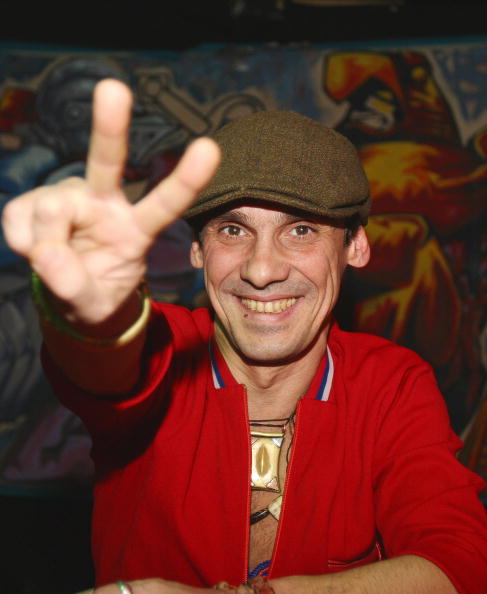What is Manu Chao's Net Worth?
Manu Chao is a Spanish and French singer who has a net worth of $4 million. Manu Chao is celebrated for his eclectic style that blends rock, reggae, ska, punk, and Latin influences with politically charged lyrics. Known for singing in multiple languages including Spanish, French, English, Portuguese, Italian, and Arabic, he has developed a global following that stretches across Europe, Latin America, and beyond. A pioneer of the world music movement, Chao first found fame in the late 1980s and 1990s with the band Mano Negra before launching a successful solo career that cemented his reputation as one of the most socially conscious and genre-defying artists of his generation.
Early Life
José-Manuel Thomas Arthur Chao was born on June 21, 1961, in Paris, France. His parents had fled Spain during Francisco Franco's dictatorship, settling in France where Chao grew up in a politically active household. His father was a writer and journalist, and his mother was of Basque origin, instilling in him a strong connection to both Spanish and French culture.
Chao was exposed early to a wide array of musical styles, from French chanson and Spanish flamenco to American rock and roll. As a teenager, he began playing guitar and performing with local bands, quickly developing a passion for fusing different genres and traditions.
Mano Negra
In the mid-1980s, Chao co-founded the band Mano Negra with his brother Antoine Chao and cousin Santiago Casariego. The group became known for its energetic live performances and its genre-blending style, mixing punk, ska, reggae, and Latin music. Their debut album, "Patchanka" (1988), established them as an underground sensation in France.
Over the next several years, Mano Negra achieved international success with albums such as "Puta's Fever" (1989) and "King of Bongo" (1991). They gained a particularly strong following in Latin America, where their rebellious energy and politically aware lyrics resonated with young audiences. One of the group's most ambitious projects was a 1992 South American tour on a cargo ship, which embodied their unconventional approach to both music and performance. Mano Negra disbanded in 1995, but the group left a lasting legacy as one of the most influential French bands of their era.
Solo Career
After Mano Negra's breakup, Manu Chao launched his solo career, taking inspiration from his travels through Latin America and Africa. His debut solo album, "Clandestino" (1998), became an international hit. Featuring songs in multiple languages, it blended global rhythms with themes of immigration, social justice, and identity. Tracks like "Clandestino" and "Bongo Bong" made Chao a household name, particularly in Europe and Latin America.
His follow-up album, "Próxima Estación: Esperanza" (2001), continued his success, earning Grammy nominations and widespread acclaim for its fusion of reggae, salsa, and ska with sharp political commentary. Later albums, including "Sibérie m'était contéee" (2004) and "La Radiolina" (2007), further cemented his reputation as a boundary-pushing artist who used music as a vehicle for both celebration and protest.

SUSANA GONZALEZ/AFP/Getty Images
Style and Influence
Chao's music is distinctive for its patchwork of sounds and languages, often sampling radio snippets, street sounds, and fragments of conversation. His lyrics frequently address themes of immigration, poverty, inequality, and resistance, reflecting his activist worldview.
Known for his commitment to social and political causes, Chao has supported anti-globalization movements, human rights campaigns, and efforts to highlight the struggles of marginalized communities. His global perspective and grassroots approach have made him not only a musician but also a cultural figurehead for progressive causes.
Legacy
Manu Chao's influence extends far beyond commercial success. He has inspired generations of musicians to embrace cross-cultural sounds and to use music as a tool for activism. His albums, particularly "Clandestino," are considered landmarks in modern world music.
Though he has often shunned the spotlight, preferring to perform in smaller venues and work outside mainstream industry structures, Chao's reach has been global. He remains a symbol of artistic independence and political engagement, continuing to blend rhythms and voices from around the world into a sound uniquely his own.
/2014/08/Manu-Chao.png)
/2014/10/GettyImages-937438648.jpg)
/2014/06/GettyImages-915976270.jpg)
/2009/12/GettyImages-168378637.jpg)
/2017/05/Adelmo-Fornaciari.jpg)
/2015/07/GettyImages-86223521.jpg)
/2009/11/George-Clooney.jpg)
/2019/11/GettyImages-1094653148.jpg)
/2020/04/Megan-Fox.jpg)
/2020/01/lopez3.jpg)
/2017/02/GettyImages-528215436.jpg)
/2019/10/denzel-washington-1.jpg)
/2020/06/taylor.png)
/2020/02/Angelina-Jolie.png)
/2019/04/rr.jpg)
:strip_exif()/2009/09/P-Diddy.jpg)
/2009/09/Cristiano-Ronaldo.jpg)
/2014/08/Manu-Chao.png)
/2015/07/GettyImages-86223521.jpg)
/2014/09/GettyImages-81749137.jpg)
/2010/07/Juan-Luis-Guerra.png)
/2018/04/Ricardo-Arjona.jpg)
/2009/12/GettyImages-168378637.jpg)
/2014/06/GettyImages-915976270.jpg)
/2015/03/GettyImages-500208512.jpg)
/2009/09/Jennifer-Aniston.jpg)
/2018/03/GettyImages-821622848.jpg)
:strip_exif()/2015/09/GettyImages-476575299.jpg)
/2009/09/Brad-Pitt.jpg)